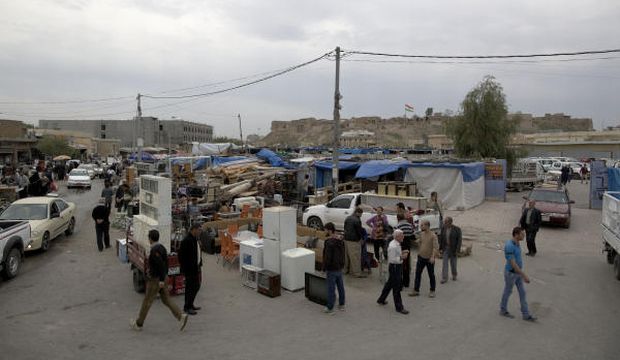
The Citadel of Erbil looms over a market where people shop for secondhand goods in downtown Erbil, 217 miles (350 kilometers) north of Baghdad, Iraq, Sunday, November 16, 2014. (AP Photos)
No group immediately claimed responsibility for the midday attack near the ancient citadel in Erbil, capital of the semi-autonomous Kurdish region in northern Iraq, though it bore the hallmarks of the Islamic State group.
Erbil has remained mostly calm but it lies close to the front-lines in Iraq’s war against the Sunni militant group. The city has taken in thousands of refugees who fled the extremists’ summer blitz that captured large swaths of northern and western Iraq, as well as a third of neighboring Syria.
Three of the four people killed in Wednesday’s explosion were guards, said Hamza Hamid, a spokesman for the Erbil governor. The Iraqi Kurdish health ministry reported at least 22 were wounded.
Hamid said the attack took place “right in front of the main entrance of the building of Erbil governorate,” which is near the citadel.
Mayor Nawzad Hadi told the state-run Rudaw TV channel that the bomber tried to enter the citadel grounds but failed, so he detonated his explosives-laden car outside the complex.
The mayor said properties in the area suffered significant damage but it was unclear if the citadel, claimed to be one of the world’s longest continuously inhabited landmarks, was damaged. The hilltop castle has a history stretching back more than 8,000 years. In 2007, the UN Educational, Scientific and Cultural Organization, or UNESCO, oversaw a project geared at restoring and preserving the ancient site.
Kurdish security forces swiftly sealed off the area. Streets outside the castle were lined by charred cars and blood stained the pavement as ambulance workers rushed to help the victims.
In their push, the Islamic State militants at one point advanced within 30 kilometers (18 miles) of Erbil, but they were beaten back by Iraqi Kurdish forces, known as the peshmerga, with the help of US airstrikes.

Trackbacks/Pingbacks